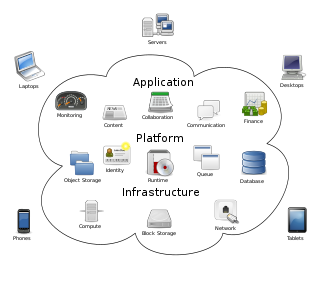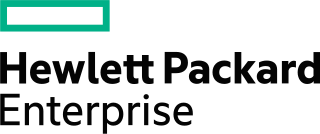Quantum Corporation is a data storage, management, and protection company that provides technology to store, manage, archive, and protect video and unstructured data throughout the data lifecycle. Their products are used by enterprises, media and entertainment companies, government agencies, big data companies, and life science organizations. Quantum is headquartered in San Jose, California and has offices around the world, supporting customers globally in addition to working with a network of distributors, VARs, DMRs, OEMs and other suppliers.
NetApp, Inc. is an American data storage and data management services company headquartered in San Jose, California. It has ranked in the Fortune 500 from 2012 to 2021. Founded in 1992 with an initial public offering in 1995, NetApp offers cloud data services for management of applications and data both online and physically.
MarkLogic Corporation, based in San Carlos, is an American software business that develops and provides an enterprise NoSQL database, also named MarkLogic. MarkLogic is a privately held company with over 500 employees and was acquired by Vector Capital in October 2020. It has offices in the United States, Europe, Asia, and Australia.
Gluster Inc. was a software company that provided an open source platform for scale-out public and private cloud storage. The company was privately funded and headquartered in Sunnyvale, California, with an engineering center in Bangalore, India. Gluster was funded by Nexus Venture Partners and Index Ventures. Gluster was acquired by Red Hat on October 7, 2011.

Dell EMC Isilon is a scale out network-attached storage platform offered by Dell EMC for high-volume storage, backup and archiving of unstructured data. It provides a cluster-based storage array based on industry standard hardware, and is scalable to 50 petabytes in a single filesystem using its FreeBSD-derived OneFS file system.

3PAR Inc. was a manufacturer of systems and software for data storage and information management headquartered in Fremont, California, USA. 3PAR produced computer data storage products, including hardware disk arrays and storage management software. It became a wholly owned subsidiary of Hewlett Packard Enterprise after an acquisition in 2010.

Cloud computing is the on-demand availability of computer system resources, especially data storage and computing power, without direct active management by the user. Large clouds often have functions distributed over multiple locations, each of which is a data center. Cloud computing relies on sharing of resources to achieve coherence and typically uses a pay-as-you-go model, which can help in reducing capital expenses but may also lead to unexpected operating expenses for users.
Eucalyptus is a paid and open-source computer software for building Amazon Web Services (AWS)-compatible private and hybrid cloud computing environments, originally developed by the company Eucalyptus Systems. Eucalyptus is an acronym for Elastic Utility Computing Architecture for Linking Your Programs To Useful Systems. Eucalyptus enables pooling compute, storage, and network resources that can be dynamically scaled up or down as application workloads change. Mårten Mickos was the CEO of Eucalyptus. In September 2014, Eucalyptus was acquired by Hewlett-Packard and then maintained by DXC Technology. After DXC stopped developing the product in late 2017, AppScale Systems forked the code and started supporting Eucalyptus customers.
GlobalSCAPE, Inc. (AMEX:GSB) is a software developer headquartered in San Antonio, Texas, United States.

CTERA Networks is a privately held enterprise software company headquartered in New York and Israel. The company has regional offices in the UK, Italy, France, Spain, Germany, and Australia. As of 2021, the company is designated as the leading vendor in distributed cloud file storage by GigaOm.

SingleStore is a proprietary, cloud-native database designed for data-intensive applications. A distributed, relational, SQL database management system (RDBMS) that features ANSI SQL support, it is known for speed in data ingest, transaction processing, and query processing.
Commvault is an American publicly traded data protection and data management software company headquartered in Tinton Falls, New Jersey. Commvault enterprise software can be used for data backup and recovery, cloud and infrastructure management, retention and compliance.
Object storage is a computer data storage that manages data as objects, as opposed to other storage architectures like file systems which manages data as a file hierarchy, and block storage which manages data as blocks within sectors and tracks. Each object typically includes the data itself, a variable amount of metadata, and a globally unique identifier. Object storage can be implemented at multiple levels, including the device level, the system level, and the interface level. In each case, object storage seeks to enable capabilities not addressed by other storage architectures, like interfaces that are directly programmable by the application, a namespace that can span multiple instances of physical hardware, and data-management functions like data replication and data distribution at object-level granularity.
The third platform is a term coined by marketing firm International Data Corporation (IDC) for a model of a computing platform. It was promoted as inter-dependencies between mobile computing, social media, cloud computing, and information / analytics, and possibly the Internet of Things. The term was in use in 2013, and possibly earlier. Gartner claimed that these interdependent trends were "transforming the way people and businesses relate to technology" and have since provided a number of reports on the topic.

HPE Helion was Hewlett-Packard's portfolio of open-source software and integrated systems for enterprise cloud computing. It was announced by HPE Cloud in May 2014. HPE Helion grew from under US$300 million to over US$3 billion by 2016. HP closed the public cloud business on 31 January 2016. HP has hybrid cloud and other offerings but the Helion public cloud offering was shut down.
The Machine is the name of an experimental computer made by Hewlett Packard. It was created as part of a research project to develop a new type of computer architecture for servers. The design focused on a “memory centric computing” architecture, where NVRAM replaced traditional DRAM and disks in the memory hierarchy. The NVRAM was byte addressable and could be accessed from any CPU via a photonic interconnect. The aim of the project was to build and evaluate this new design.

Dell Technologies PowerFlex, is a commercial software-defined storage product from Dell Technologies that creates a server-based storage area network (SAN) from local server storage using x86 servers. It converts this direct-attached storage into shared block storage than runs over an IP-based network.
Nasuni is a privately-held hybrid cloud storage company with headquarters in Boston, Massachusetts.

OpenIO offered object storage for a wide range of high-performance applications. OpenIO was founded in 2015 by Laurent Denel (CEO), Jean-François Smigielski (CTO) and five other co-founders; it leveraged open source software, developed since 2006, based on a grid technology that enabled dynamic behaviour and supported heterogenous hardware. In October 2017 OpenIO completed a $5 million funding round. In July 2020 OpenIO had been acquired by OVH and withdrawn from the market to become the core technology of OVHcloud object storage offering.
Datera was a global enterprise software company headquartered in Santa Clara, California that developed an enterprise software-defined storage platform. Datera was acquired by VMware in April 2021.








